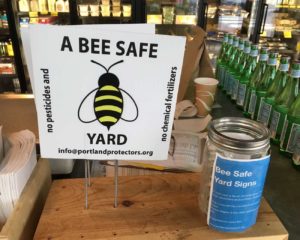Portland Protectors Support South Portland Ordinance
by Tony Zeli
Portland Protectors is a local group that promotes organic land care practices. In a press release, they call a draft pesticide ordinance created by the Pesticide & Fertilizer Task Force “an extremely flawed document that allows the pesticide industry to regulate itself, while advancing the industry falsehood that all pesticides are equally risky.”
On Wednesday, June 21st, the City Council’s Sustainability and Transportation Committee will review two pesticide ordinances – one drafted by the City’s Task Force as well as the South Portland pesticide ban that was passed in 2016.
The Committee will accept public comment at the June 21st meeting. The meeting will be held in Council Chambers, City Hall, beginning at 5:30 p.m.
District 2 (West End-Parkside) Councilor Spencer Thibodeau is Chair of the Sustainability and Transportation Committee. He says, “I have long been concerned about the impact these chemicals have on our community and the environment. In order to achieve a strong pesticide ordinance, I have asked the Committee to consider both the South Portland pesticide ordinance and the Task Force recommendation.”
Mayor Ethan Strimling considers a pesticide ordinance an environmental must for the City. He states, “My goal in appointing the Task Force was to find a workable way that we can take the extensive and comprehensive work already completed in South Portland and tailor it to fit Portland’s needs.”
Task Force and South Portland Ordinances Considered

The Portland Protectors’ bee signs demonstrate support for an organic pesticide ordinance. -Photo by Tony Zeli
The pro-organic Portland Protectors group support the South Portland ordinance. They note that it is based on organic principles of building soil fertility. Further, the South Portland ordinance relies on the standards of the National Organic Program. This program maintains a regularly updated list of pesticides and land care products that have low acute toxicity and break down rapidly in the environment.
In contrast, conventional pesticides must meet lower thresholds to be approved by the Environmental Protection Agency and the Maine Board of Pesticides Control.
According to the City, the Task Force’s draft ordinance prohibits the use of any pesticides, organic or non-organic, on turf areas in the City of Portland. This includes public and private lawns, athletic fields, parks, patios, driveways and walkways.
Portland Protectors say this does not go far enough. Accordingly, the ordinance should apply to all property in the City. They highlight that playgrounds, golf courses and trees are missing from the list.
Waivers
Also, a property owner under the Task Force ordinance would be able to apply for a waiver from the City to apply a pesticide in certain situations. For example, to control invasive plants or to protect public health and safety. The City would be required to issue a response within three days and may require specific conditions and safeguards.
Further, the draft ordinance would establish a Pesticide Oversight Committee. This committee would develop and distribute educational materials to educate residents and businesses about the ordinance and landscaping practices that do not require pesticides. Also, this group would prepare an annual report to the Sustainability and Transportation Committee on pesticide use in the city.
A total of 27 Maine cities and towns have adopted pesticide restrictions. South Portland and Ogunquit have two of the strongest organic ordinances in the country.






